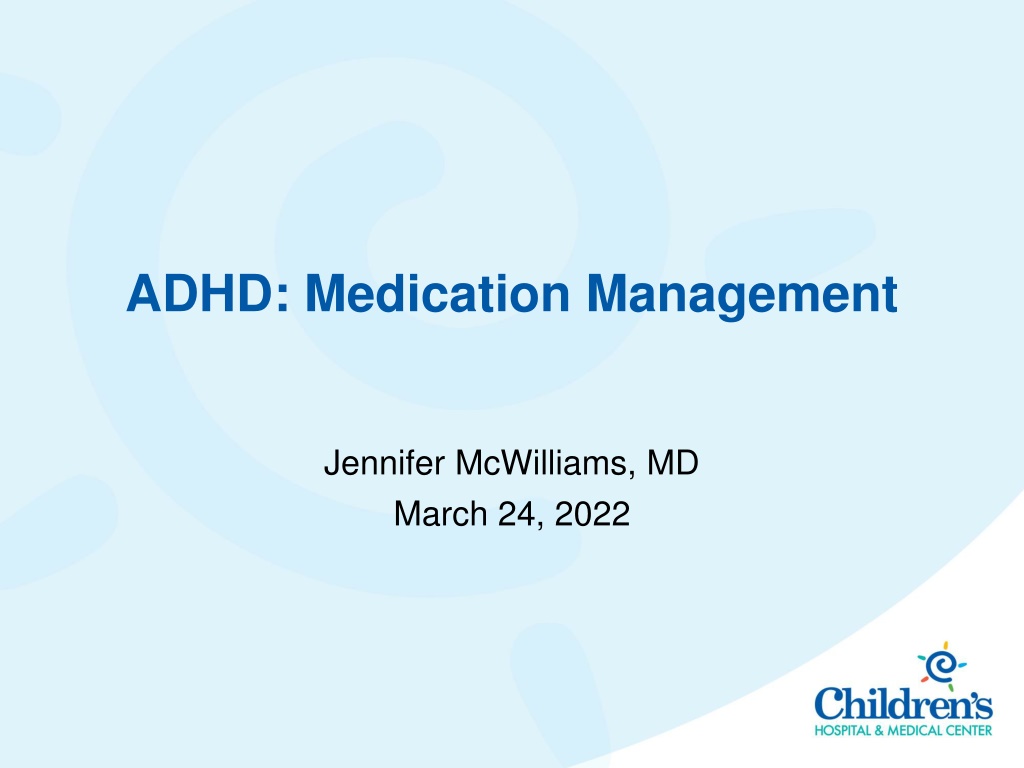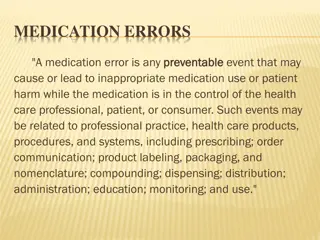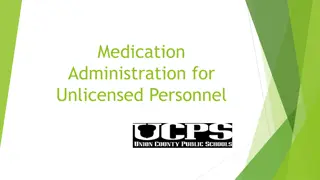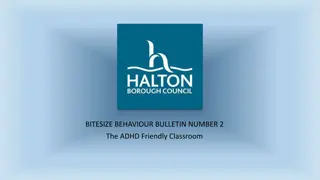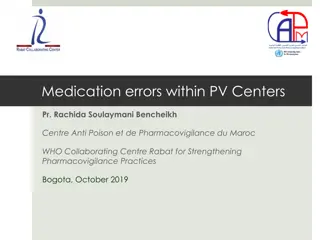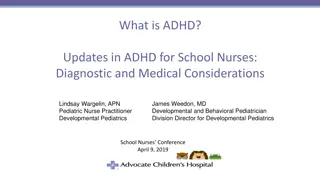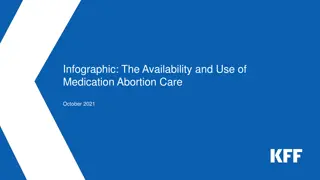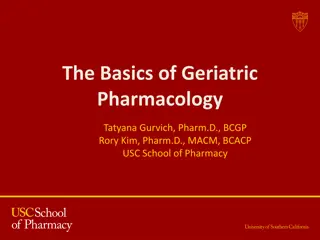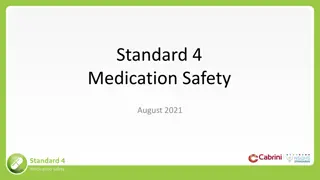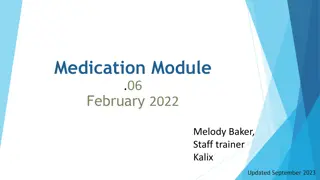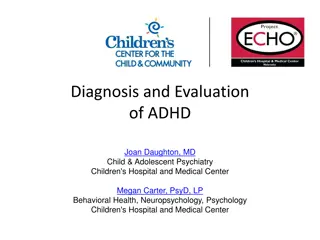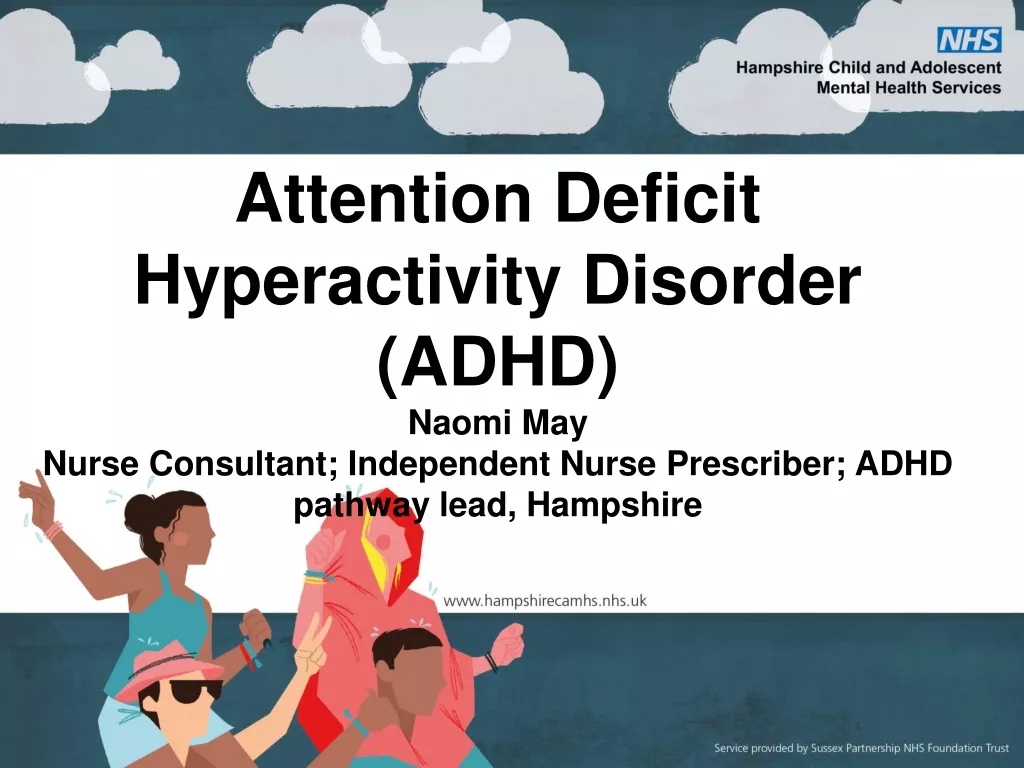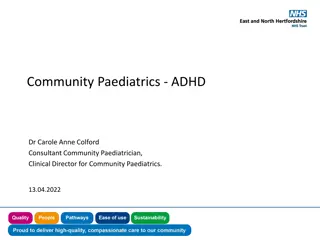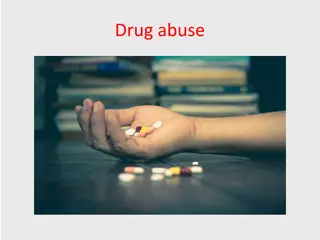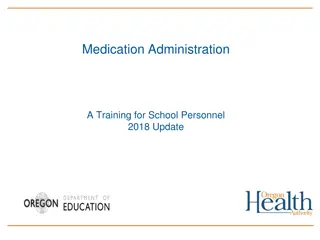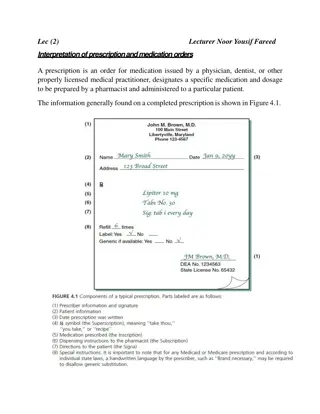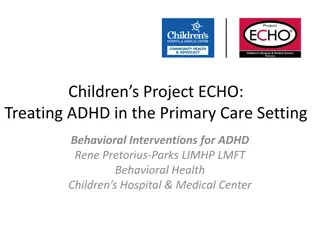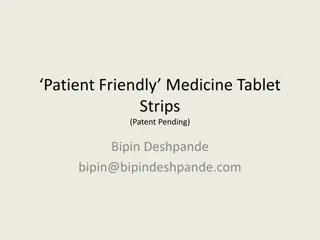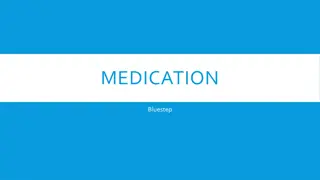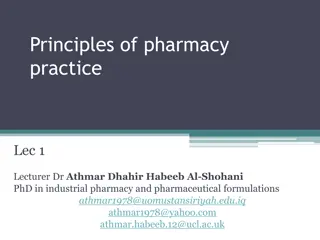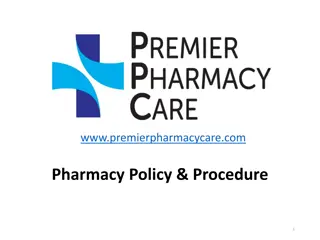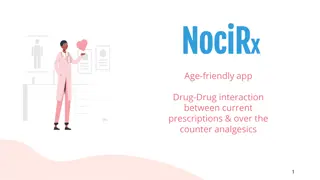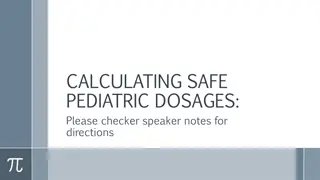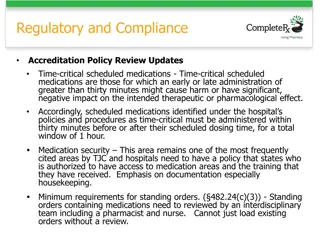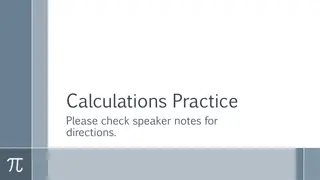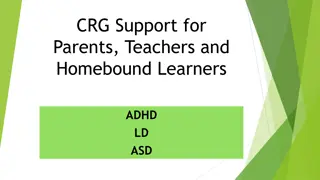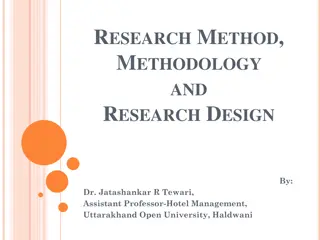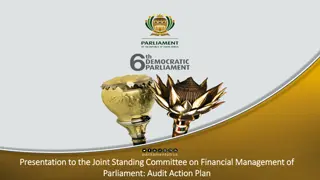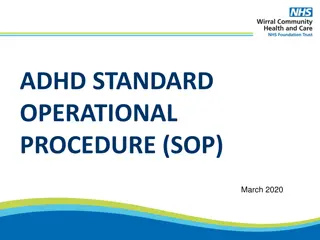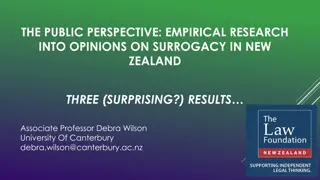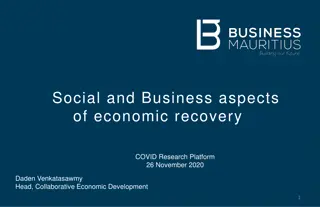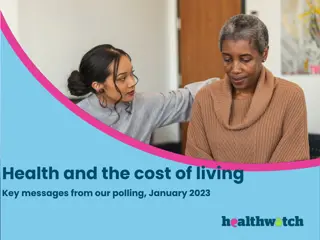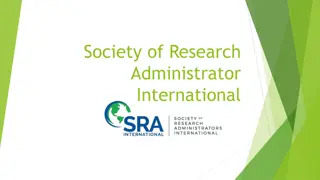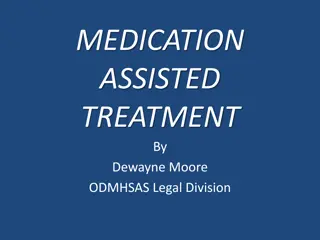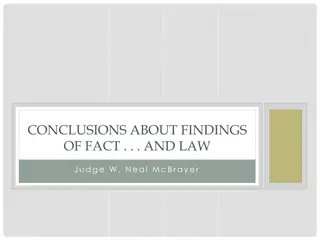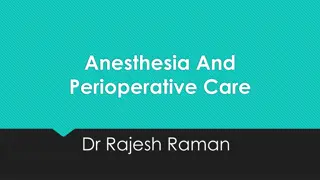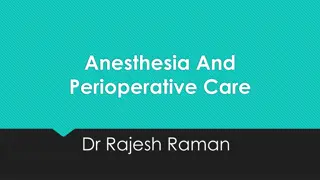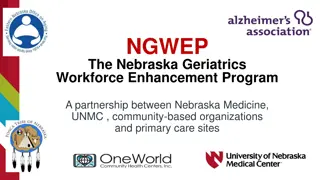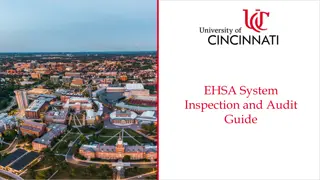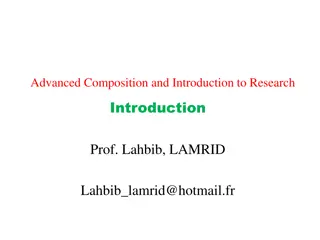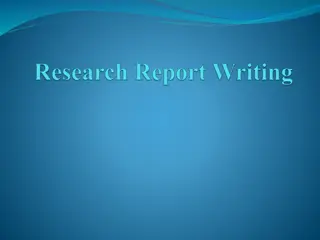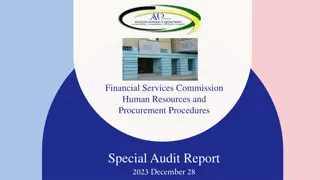ADHD Medication Management Strategies and Research Findings
Reviewing common medication strategies for treating ADHD, this presentation by Dr. Jennifer McWilliams explores clinical challenges, side effects, and new medication options. The discussion includes the Multimodal Treatment Study of Children with ADHD (MTA) and the Preschool ADHD Treatment Study (PATS), highlighting the efficacy of methylphenidate and the management of ADHD symptoms in children. Key issues encountered include inadequate medication response and intolerable side effects.
Download Presentation

Please find below an Image/Link to download the presentation.
The content on the website is provided AS IS for your information and personal use only. It may not be sold, licensed, or shared on other websites without obtaining consent from the author. Download presentation by click this link. If you encounter any issues during the download, it is possible that the publisher has removed the file from their server.
E N D
Presentation Transcript
ADHD: Medication Management Jennifer McWilliams, MD March 24, 2022
Disclosures None
Objectives 1.Review common medication strategies for treating ADHD 2.Discuss frequent clinical challenges of medication, including side effects and incomplete responses to medication 3.Gain knowledge of new medications available
Treatment Pharmacotherapy Behavioral interventions
Treatment Research - MTA MTA - Multimodal Treatment Study of Children with ADHD 597 kids (7-9.9yo) at 6 sites with limited exclusion criteria Four treatment arms - Medication - Combination - Psychosocial - Community
Treatment Research - MTA At 14mos, pts on MTA med algorithm (either alone or in combo) had superior response for ADHD symptoms Pts receiving combo treatment had superior response for some non-ADHD symptoms Kids tolerated meds well
Treatment Research - PATS PATS - Preschool ADHD Treatment Study 3-5yo at 6 sites treated with methylphenidate 8 phases Enrollment/Screening (303 kids) 10 wk parent management training course (279 kids) Baseline assessment (261 kids) 1 wk open-label safety lead in (183 kids) 5 wk double-blind, placebo-controlled crossover titration study (165 kids) 4 wk randomized, double-blind parallel phase (114 kids) 10 mos open label maintenance trial (140 kids) 6 wk randomized, double-blind, placebo discontinuation (29 kids)
Treatment Research - PATS Methylphenidate found to be effective Lower doses used (0.7mg +/-0.4mg/kg/day) Slightly lower effect size (0.4-0.8) Higher rate of side effects Emotional reactivity/irritability Appetite loss with weight velocity decreases Sleep difficulties Stomachaches Social withdrawal Lethargy
Where do we run into problems? The medicine isn t working or isn t working well enough The medicine is causing intolerable side effects Nothing works
Problem 1: Med improves symptoms, but not fully Is the dose appropriate for the kid s wt? Methylphenidate meds Start at 0.5mg/kg, titrate to 1.5-2mg/kg/day Side effect - decreased appetite, insomnia, stomachache, headache, irritability, aggression, rebound Dextroamphetamine meds Start at 2.5mg/day for kids 3-5yo, 5-10mg/day for older kids, titrate to 0.5-1mg/kg/day (1.5mg/kg/day?) Side effects - similar to Methylphenidate (more frequent??) Monitoring - Ht, Wt, BP, Pulse
Problem 2: Mornings are good, but afternoons aren t Duration of Behavioral Effect Medication Duration of behavioral effects A PDR myth in ADHD kids? Booster doses? Non-stimulants? Ritalin 3-5 hrs Methylin 3-5 hrs Focalin 2-5 hrs Ritalin SR 3-8 hrs Methylin ER 3-8 hrs Ritalin LA 6-8 hrs Focalin XR 10-12 Concerta 8-12 hrs Metadate CD 6-10 hrs Dexedrine 3-6 hrs Adderall 4-8 hrs Dexedrine Spansule 6-8 hrs Adderall XR 10-12 hrs Vyvanse 10-14 hrs
Problem 3: Early mornings and late evenings are bad Onset of action Fast, but not that fast Earlier dosing? Non-stimulants? Medication Onset of Action Ritalin 20-60 min Methylin 20-60 min Focalin 20-60 min Ritalin SR 60-90 min Methylin ER 60-90 min Ritalin LA 30 min 2 hrs Focalin XR 30-60 min Concerta 30 min 2 hrs Metadate CD 30 min 2 hrs Dexedrine 20-60 min Adderall 30-60 min Dexedrine Spansule 60-90 min Adderall XR 1-2 hrs Vyvanse 1-2 hrs
Problem 3: Early mornings and late evenings are bad (cont.) Alpha-2 Agonists (clonidine, guanfacine) BID dosing Clonidine Start at 0.025-0.05mg/day Titrate by similar doses every 7days Max dose = 0.3mg/day Guanfacine Start at 0.5mg/day Titrate by similar doses every 7 days Max dose = 4mg/day Side effects - Sedation, dizziness, hypotension, headache Must avoid abrupt discontinuation Monitoring - Pulse, BP
Problem 3: Early mornings and late evenings are bad (cont.) Atomoxetine 58-64% of patients treated for 6-12 weeks had 25-30% improvement in sx Start at 0.5mg/kg and titrate to 1.2mg/kg Can divide dose to BID Greatest effects at 6-9 wks Side effects - decreased appetite, sz and long QT with OD
Problem 4: An adequate dose isnt working at all Head-to-head trials Equal efficacy between stimulants Similar side effect profiles Switch med classes?
Problem 5: Its working but the patients weight is dropping Supplementing calories Dose-dependent response? Non-stimulant alone or as an augmenting agent?
Problem 5: Weight (cont.) Stimulants and Growth Studies can seem clear as mud Most studies show children on stimulants have decreased velocity of growth Effect seems to be greater for taller and/or heavier kids Children seem to be more effected than adolescents Most studies show that the velocity deficits attenuate over time (avg ~ 3 years) But deficits increase with the amount of time on meds
Problem 5: Weight (cont.) No difference is seen between methylphenidate and amphetamine meds Deficits seem to be dose-dependent Growth seems to rebound once med is discontinued Drug holidays may help with growth, but must weigh the pros and cons of having child off of meds Some researchers postulate that growth deficits may be part of pathophysiology of ADHD itself? No clear data on ultimate effects on adult stature?
Problem 5: Weight (cont.) Strategies: Time dosing and meals so that kid is hungry at mealtime Encourage high-energy, nutritious snacks If necessary, lower dose or switch meds Bottom Line _______________________ Monitor Ht and Wt Closely
Problem 6: Its working but the patient can t sleep Is it really the medicine or a factor of ADHD? Sleep aides? Melatonin 3-6mg qhs Diphenhydramine or hydroxyzine 25-50mg qhs Trazodone 25-50mg qhs Non-stimulants?
Problem 7(a):Nothing works Is it really ADHD? Differential DX Anxiety (Restlessness, distractibility) Mania (Irritability, hyperactivity, distractibility, talkative) ODD/Conduct disorder (Impulsivity, defiance) Learning disorders (Frustration leading to poor attn, behavior)
Problem 7(b):Nothing works Is the kid taking the medication? ODD? Diversion?
Other Topics: Cardiac Risk? Agitation? Hallucinations? Tics?
New(er) medications* Methylphenidate Aptensio XR (long acting) Quillavent XR (long acting liquid) Quillachew ER (long acting chewable tab) Amphetamine/Dextroamphetamine Adzenys XR-ODT (long acting disintegrating tablet) Dyanavel XR (long acting liquid) Evekeo (racemic mixture) Zenzedi (short acting, incremental dosing) Non-Stimulant Intuniv (long acting guanfacine) Kapvay (long acting clonidine) *A rose by any other name
